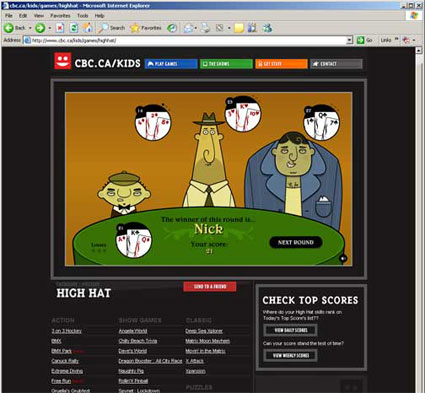Thanks to Loc and the gang, the BigSnit blog has moved to WordPress. I’ll spend the next couple of days mucking around with themes, then will switch over. Stand by !
I’ve now retro-posted by bringing over posts from the old site and ported them here to work with WordPress. Thanks LOC!!!!
All posts by Robert Ouimet
Playstation Portable Browsing
 Today’s blog comes with a companion podcast. Get it here
Today’s blog comes with a companion podcast. Get it here
If you love it so much you should marry it !

My love affair with my Play Station Portable made another leap this week. The PSP is an awesome game device, and its screen makes watching movies a treat. The built in wireless to date has been unexciting, since all it did was check for software updates.
That was until this week. All that changed with Sony’s latest software update, which includes control over the desktop theme, support for more types of audio, image and video files, and best of all, a web browser. Oh baby.
Entering URL’s is a bit of a pain, but a few customized link pages will solve that – and it stores favourites just like your desktop browser.
For months now I’ve been raving about the video quality on this device, and being able to load up demo reels for clients is a real asset. Since it will play still images in a slide show mode, I’ve even converted a few of my powerpoint presentations to play on the PSP’s wide screen. Say it with me now, Oh Baby.
This week also marked the release of the PSP in Europe, look for lots of PSP innovation in the months heading into the Christmas rush. Now if Sony would just open up the market on the clamshell disc so we could record movies on them instead of memory sticks – we’d all be screaming Oh Baby.
The news just takes itself too damn seriously.
(with apologies to my friend Anton)
Who needs CBC comedy shows when we’ve got the daily papers. Two stories in today’s Vancouver Sun, apparently completely unrelated. Hmmmm ?
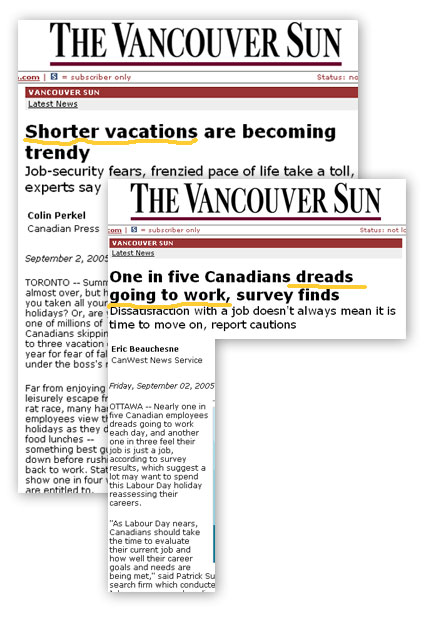
And taking things a bit too seriously…
The lockout at CBC seems to be frying some brain cells. Quirks and Quarks producer Jim Handman claimed in a letter to the editor that his team created podcasting to CBC. This was in reply to an earlier article quoting a manager who made reference to new technologies, like podcasting, and how they are changing the landscape at CBC, and how it is important for CBC to keep up to these rapid changes. Jim’s rebutal was super cutting, saying how his team of STAFF employees (not contract employees) came up with this [podcasting] innovation. It’s a nice argument, but it’s incorrect.
Back in the mid-nineties, we had gigabytes of audio available for download. This was for our show RealTime, which was live in real time, across Canada and around the world on the Internet. Produced at CBC Vancouver (by a bunch of contract employees, not that it really matters) we had an impressive archive of material available, until CBC got nervous about downloading and told us to remove the files. Joe Lawlor at CBC Toronto was also doing the same. As everyone knows, podcasting is just another form of downloading files; after all it’s an RSS attachment of an mp3 file. So Jim, it’s terrific you guys are doing it, but sorry dude, you didn’t start it, not by a long shot.
Five Things I Like
If this is Tuesday, it must be time for Five Things I Like.
1. My Current Spam Filtering.
The lengths I’m going to in order to avoid dealing with spam remind me of the advice my Dad gave me on avoiding teen pregnancy:
Put the condom on before you leave on a date.
Make sure your date is on the pill,
And never, ever, have sex.
Dad would appreciate my current precautions. Loc’s running spam filtering on the mail server, which is doing a lot to catch the first layer. Office 2003’s version of Outlook filters out a good slice of junk, and I continue to run SpamBayes which catches the stuff the first two didn’t. What I like is that, regardless of how ridiculous it seems, it works.
2. Technology Leapfroging.
New Zealand is going to an all VoIP phone system. Sitting back watching the other guys can pay off – the entire country will be VoIPed by 2012, according to Telecom. What I like is when a little country leapfrogs the rest of us.
3. My VoIP Phone.
I know there are free alternatives, but for business purposes, Vonage Canada has been the right answer for me. What I like is the web interface to every feature, from call forwarding to being able to retrieve mp3’s of my voice mail.
4. Don Tapscott’s Blog.
If you haven’t yet had a chance to see it, make sure you catch Don Tapscott’s blog at www.ageoftransparency.com/blog . Super insightful and an interesting take on corporate culture; you’re going to be naked, you better be buff. What I particularly like his retelling of a recent Toronto radio experience.
and…
5. Maybe It Just Feels Like 3 Weeks.
I promised I wasn’t going to say anything more about the CBC lockout until something happened. Today the two sides decided to get back to the table – which is good of course. This on the heels of an article in the Globe yesterday that cites a study showing Canadians aren’t too concerned about the lockout. What I like is the Globe’s math.

Six Lessons for Broadcasters

With everything that’s been said about podCasting, there are a bits on the trailing edge I’d like to pick up on.
Lesson Number One: There’s No Going Back.
The lessons for traditional radio are enormous. They’re the same lessons marketers everywhere are paying attention to, as are publishers and every middleman involved in the communications industry. They’re paying attention because models we’ve grown accustomed to are changing, and no one knows for sure just where they are taking us. What’s for certain is, once people change, they rarely go back to the old way of doing things.
Lesson Number Two: They’re On the Other End of the iPod.
I’ve been fascinated listening to broadcast executives justify their inability to understand what is going on, by challenging change with “but where’s the business model”. This is one of the great cries of the unconvinced. I heard it during the early days of the Internet in regards to web pages, and again when it came to online audio. Podcasting has no clear business models, yet. Better to ask, “Where’s the audience”. We know the answer; they’re on the other end of an iPod.
Lesson Number Three: You Can No Longer Fool Very Many People for Very Much of the Time.
Broadcasters need to break down what’s happening here. For years they’ve argued that they’re essential, based on a quality of service argument. They hire ‘real’ journalists, they have ‘standards’ etc. On the basis of thier QOS argument, podcasting is a joke – the quality can be terrible and the reliability is spotty. But wait – why are there so many of them out there, and why are people clamoring to get them ?
One reason is they’re providing an array of content. A stunning array that grows daily. Broadcasters meanwhile, continue to rely on the same 200 songs or the same 20 topics for the call in show. When your public has been nurtured on a seemingly unlimited number of options, just a click away, it simply isn’t interested in highly limited choice. There’s a new universe out there, and we just aren’t buying the notion that Jack’s the only person with a handle on it.
Lesson Number Four: Give Me What I Want When I Want It or Get Out of the Way.
A podCast is delivery on demand. By subscribing to a feed, you get one every time there’s something new from the content creator. No waiting for an allotted time, no fuss, no muss. It is stupidly elegant. This is exactly what both the busy professionals and the slacker is looking for. If you can’t give me what I want, when I want it, I’ll go find it somewhere else.
Lesson Number Five: Changing Habits Create Changing Media.
There’s no denying that the biggest factor in the success of podcasting isn’t even the technology; podcasting is just an attachment in an RSS feed. The biggest factor is the iPod. It is also stupidly elegant, and it’s a platform vacuuming up content at every opportunity. The iPod is the new industry standard for audio – soon for video – and I’m certain, soon for books. It’s affordable, it’s easy to use, it works, and it even looks nice.
Like the transistor radio, the iPod is creating a massive change in the way we consume content. The proliferation of podcasts is grist for the evolutionary process, leading us to a new generation of audio consumers and audio services. Media is changing, and changing fast.
Lesson Number Six: We Come In Peace, But There Are a Lot of Us.
The business models that result from all these changes will be as unpredictable as the changes themselves. podCasting is still evolving, it’s barely out of its Geek diapers. People are catching on and turning to these alternate sources for their entertainment and information in numbers no-one predicted. Where there are people, there’s the opportunity to create revenue. It may not fit a broadcaster’s current sales template, but just watch the models pop up over the next few months. It’s damn exciting and rife with opportunities.
Chances are, if you don’t know what that the symbol at the top of the page means, you’re still not convinced. If that’s the case, I’d be more than happy to help.
Satellite Radio ReThink

The Globe and Mail is reporting today that the cabinet may ask the CRTC to review its recent satellite radio decision.
There’s been loads of lobbying by arts groups, saying that Canadian artists won’t get enough exposure on the new channels. There’s also a legal argument being posed saying that since satellite radio is controlled by American interests, the current proposals do not meet the CRTC’s own guidelines about who controls the airwaves in Canada. Because this is Canada, there’s also another group who are lobbying against the lobby. The CRTC must have done something right if everybody is pissed.
The results of a possible review are uncertain. The CRTC rarely ends up changing its mind or its rulings, but these reviews give politicians an answer to critics.
Trying to protect the Canadian airwaves in an era of global communications requires some inventive strategies and some new thinking. Creating a ghetto of Canadian satellite channels that no-one listens to isn’t going to help anyone. Sure we should excercise regulatory clout to ensure that Canada benefits from the introduction of satellite radio, but asking for more Canadian channels isn’t going to help. It most likely will make the situation worse.
The root of the problem is that the channel operators will spend as little money as possible on these Canadian channels, the result of which will be negligible listernship. In order to add more channels, the American operators either have to remove existing channels, or lower the bit rate. They’re already squeezing out as much music as they can, so adding more Canadian channels to the mix is going to mean dumping some fine Made-In-The-USA channels. Not a problem in Canada, but a big problem in the US market, where things like the all-Elvis, all-Rolling Stones and Howard Stern channels are the real money makers. Can you imagine them being bumped for the all-Trooper channel ?
Making the operators carry more Canadian channels will just result in more generic, auto-programmed channels requiring as little human intervention as possible. They will be middle of the road and as low cost as possible, and as inoffensive to Americans as possible. Cable TV already has dozens of these music channels made by Galaxie (which wins the award for worse use of clip art) and MaxTrax. They’re run by digital juke boxes, and these automatons crank out loads of Canadian Content every hour of every day, without the help of any humans. Any of these channels could easily be switched to become one of the new mandated CanCon channels, at negligible cost.
Here’s what young Canadian artists have already told the CRTC. Getting airplay on popular U.S. satellite channels does wonders for their careers. What we need are channels that aren’t run on a shoe-string or the result of some rehash of previously aired material. What we need is inventive and responsive programming that works hard to attract an audience.
It’s simple. We’d be far better off with one kick ass Canadian channel on those new satellite services, than ten or fifteen auto-pilots working their way through the MAPL catalogue.
Naked Cape Guy and the Skipper
I’m not sure if anyone else saw him, but there was a guy wearing a black cape and a strategically placed camera bag walking down Granville Street today around 2pm. Cape and camera bag, that’s it. The naked cape guy looked rather jolly, as only a naked guy in a cape in the middle of the afternoon can be, I guess.
Previously, I had passed the skipping guy over by the Hotel Vancouver. He was full-on skipping down the street, his arms whirling faster and faster as he made his way up the block, sweating up a storm. The only problem with this is that he didn’t have an actual skipping rope, or any rope at all. A skipping mime in training maybe?
All this made me question my own grasp on reality. I’m certain both these guys probably took one look at me, and later, writing in their blogs, commented:
“I passed a guy in a dress shirt and freshly ironed pants today. He looked like one of those new media types, you know, the people who make stuff out of nothing. He looked like he was in a hurry, probably on his way to talk to other people about making stuff out of nothing. Who let this guy out on the street ?”

Wired in a ChinaTown Alley
A Chinatown alley, San Francisco.

This was my first trip back to San Francisco after leaving Radical. Their office on Berry St. in China Basin had since shut down when I came back in 2001 for the Webby Awards, CBC Radio 3’s first time nominated . I found the irony of this telco box in the high-tech mecca of North America too much to resist. From what I could tell it was still functioning, in spite of (or perhaps because of) a few sketchy looking splices.
A Stern Warning

A once proud master of the high seas now sits welded in place, part of a major redevelopment of the old shipyards in North Vancouver. Soon to be surrounded by condos and sparkling retail stores, I’m sure they’ll clean her up before the yuppies move in.

Hot Day, Minor Thoughts.
It’s another hot, 30 degree day in Vancouver, and it reminded me of the early morning heat of South America.
These kids would be in their mid-twenties by now. Taken early one morning, after a late night of Polar beer and loads of food. I stumbled out of my hammock in La Puerta, Venezuela. A lovely town, with warm and wonderful people. I wish I had stayed for weeks instead of two days. It was 1987 and three days earlier I had been on assignment in Yellowknife, North West Territories, so it was a bit surreal

Today’s minor thought about the CBC lock-out.
Those clever CBC folks.
It’s too bad the CMG, the union that represents those locked out employees at CBC, don’t get the web or the Internet. With the lockout at CBC, it would be the perfect opportunity to use the power of the ‘Net.
Lots of their members do – but most of them have found themselves without email, since they’ve relied on their free corporate email accounts. CBC has a very good web interface to their mail system and one of the perks of working there is web mail. Understandably, most treat it like a personal account, so much so that some were surprised when it was shut down. Doh. If the union was thinking, they’d adopt the same naming conventions used by CBC, (firstname_lastname@cbc.ca) and give all their members email accounts with a cmg.ca domain instead of their cbc.ca domain.
Meanwhile, CBC’s heft in the media world shows up in the most interesting ways. In today’s Vancouver Sun online edition, a long story about the union complaints about BBC material on CBC, and how they’re rallying their union brothers/sisters in the UK to pressure the BBC. Down at the bottom of the page, as part of a Google Ad buy – there’s the link to the CBC corporate pages , giving their side of the story on the labour dispute. Smart. This is the first of these I’ve seen, but I’m sure they are all over, since CBC has tons of ads in the blogosphere. Chalk one up for good use of the ‘Net.
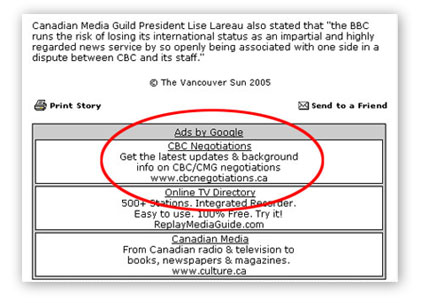
Meanwhile, there is lots of hoopla over locked out CBC staffers taking up the podCast as one way of flexing their might. It sounds grand – all those talented radio folks especially, out there, quite capable of launching their own alternate service on the web. Five days into the lockout, and so far they’ve only been able to come up 7 minutes of material. Ouch. With luck they’ll make me eat my words.
So far most of the locked out member blogs have been about how hard it is to spend 4 hours on picket duty. Tod Maffin has a list of the union members’ blogs on his site.
Oh, and just for the record, the OUIMET blog from Toronto is no relation to me. This is me here.
Oh x 2. The At Large Media newsletter is out today – you can get a copy at www.atlargemedia.com/news.html
Relaxing on a Hot Summer Day

Where cars go to relax on a hot summer day.
Cordova St., Vancouver, August 2005
A couple of things I came across the last few days that I wanted to pass along.
Good advice: avoid texting while driving.
YouTube: Trying to be to video what Flickr is to stills.
Blank Slate: My kind of keyboard
Antiques at Hastings

Antiques. Richards & Hastings, Vancouver, 16 August 2005.
CBC is not 404 – it just looks that way
We’re Not 404 – We’re Just Experiencing Labour Difficulties
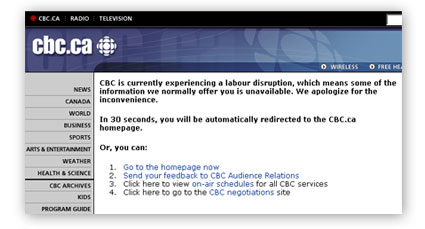
The lock-out at CBC is sparking lots of discussion in our family and with acquaintances.
I don’t rely on CBC for my news, information or entertainment, so the lockout is really just on my periphery. But my business partner Emma Payne was supposed to be a guest on the local call-in show here in Vancouver today, so we’re a bit bummed about things being shut down.
I should be clear about my past experience at CBC: I worked at CBC on contract for over 20 years, and in the last few years was involved in labour negotiations, not as a labour specialist but as a content specialist. I chose not to renew my contract last year, and have since gone into partnership with Emma Payne at At Large Media in Vancouver BC
You’d think that in this day and age there would be better ways to settle things. You’d think that a company that is considered one of Canada’s top 100 employers could find a better way to deal with their employees.

I wonder how long they get to keep the title given that most of their staff
are locked out. Maybe it’s like world wrestling and they have to
defend their ‘top employers’ belt in a no-holds-barred grudge match.
I realize that labour agreements are complex, but when you get right down to it, these are among the most creative and interesting jobs around. Before Canada’s video game industry grew to the size it is today, jobs in radio and TV were THEY dream job for a lot of young creative Canadians. Even though I disagree with some of their direction, and regardless of what you think of the CBC in general, it has a long history of creating some awesome stuff.
The main issues, at least according to what both sides are saying publicly, are life-work balance and contracting out. 70 percent of CBC’s employees are vested staffers who essentially have a job for as long as they choose to stay there, or extreme bumping rights if they get laid-off, or as has been done in the past, extremely lucrative buy-out packages for early retirement. Any way you look at it, this is a tremendous luxury in this day and age, and you can understand why the union is fighting to hang on to it. But at what cost ?
Then there is “life-work balance”. There are no employees at CBC who work more than 37 1/4 hours a week without getting overtime or time off in lieu. Have a think on that. These aren’t heavy lifting hours pulling trash cans off the street or laying brick or even hauling mail from door door through sleet, snow, ice and canines. These are office hours, spent in pretty nice offices, with modern equipment, doing ultra cool work. They may be intellectually grueling hours, but still…
According to a study by the National Sleep Foundation, the average employed American works a 46-hour work week; 38% of the respondents in their study worked more than 50 hours per week. In Canada, work weeks have been trending steadily downward, and those CBC folks are clocking about 4 more hours a week than is the average in Canada. By comparison, the average doctor in BC works a 50 hour work week – that’s before teaching or being on-call. Workers in Norway and the Netherlands work the least number of hours (according to the OECD) and you can see how relaxed they are.
But you don’t have to go too far afield to find some comparisons that are more salient. Take the video game industry. Here are some highlights:
34.3% of developers expect to leave the industry within 5 years, and 51.2% within 10 years.
Only 3.4% said that their coworkers averaged 10 or more years of experience.
Crunch time is omnipresent, during which respondents work 65 to 80 hours a week (35.2%). The average crunch work week exceeds 80 hours (13%). Overtime is often uncompensated (46.8%).
44% of developers claim they could use more people or special skills on their projects.
Spouses are likely to respond that “You work too much…” (61.5%); “You are always stressed out.” (43.5%); “You don’t make enough money.” (35.6%).
Contrary to expectations, more people said that games were only one of many career options for them (34%) than said games were their only choice (32%).
This is taken from a study by the IDGA – you can get your own copy at
http://www.igda.org/qol/whitepaper.php
The point is, work-life/life-work balance is relative – it means one thing if you’re at the CBC and another if you’re at game company and another if you’re picking berries in the Fraser Valley.
The folks who are outside the CBC buildings across the country are highly skilled workers. They do world class work, win countless awards every year, and make pretty good stuff in any given day. By all accounts they are plugged-in and up-to-date with what’s going on in the world. After all, they work for a Canadian media giant, and they got to where they are because they’re the best at what they do. They’re high acheivers, at the top of their game, with loads of options. I’d hope that they could figure out how to manage their own work-life balance issues. And I realize that no-one’s talking about salaries in this dispute, and don’t get me wrong, I think they should get paid really well for the work they do, but if you’re interesting, you can see how those 37 1/4 hours get compensated – the salary scales are here.
Oh, then there’s that permanent staff issue. But I’m the last person who should be commenting on that. I’m such a goof that in my 20-plus years at CBC, the last thing I wanted was to become permanent staff. I far prefered being on contract (which by the way comes with a salary premium at CBC, so you actually take home more money if you’re on contract) so I could decide my own fate rather than have one assigned to me.
if you’re wondering about the labour dispute and want to read what both sides have to say, visit www.cmg.ca and www.cbcnegotiations.ca . And Tod Maffin is been keeping a running commentary on his blog.
Short Shots
These guys drive me crazy. Now the RIAA is complaining (again) about blank CD’s and how burning CD’s is one of the reasons record sales suck. We’re already paying a levy on blank media, so I’m not sure why they’re on this again. I’m thinking maybe they’re missing something – maybe record sales wouldn’t suck so bad if the records they were making didn’t suck so bad.
Living next to the US tends to give us Canadians a bit of an inferiority complex. But when it comes to high speed connectivity, we’re miles ahead of our pals in America. In fact, Canada has the highest high speed connectivity of any country in the G7. However, when it comes to cell and other mobile services, both our countries suck. Great article Op Ed piece in the NY times on this very topic.
People are going to think I’m picking on the CBC, but really, I’m not. After all, I worked there for over 20 years; I just can’t help it. The headline reads “Man Dies After Marathon Video Game Session”. I was surprised to see a headline reading “Man Dies After Marathon Video Game Session” on the front page, up there with real big stories. More surprise when I clicked through, and discovered this banner ad right next to the story.
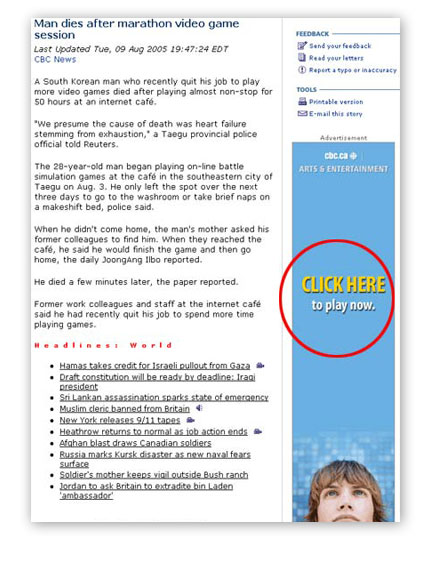
OnLine Poker for the Kids!
The Radio Bubble Starts to Burst
The radio bubble pops.
It’s no surprise to anyone, except maybe the very people who should be most aware of it. I’m talking about the research released in Canada by Ipsos-Reid showing that Internet use has now surpassed time spent listening to the radio.
This isn’t some statistical aberration; it is a clear trend, particularly among 18-34 year olds. Couple that with Adam Curry getting 8.5 million dollars (US) to fund Podshow Inc. and, well, it’s got to make even the most conservative traditional broadcasters take notice.
For years I’ve been suggesting that broadcast radio has been in a bubble that’s about to burst. What we’re seeing is the start of what will be a massive change to broadcast radio.
Nowhere in the world will this be more pronounced than in Canada, where we have the highest broadband penetration of any country in the G7, and a financially healthy radio industry. It is the public broadcaster here that faces the toughest challenges, and the biggest opportunities.
Public broadcasting goals are a terrific match for Internet content distribution. A much better match in fact than any private broadcaster. Public broadcasting puts ideas ahead of popularity, and specificity ahead of broad public appeal. Public broadcasting isn’t a channel per se, but rather a rich and vibrant collection of different types of programs, housed by a set of values. And that’s one of the Internet’s (many) great strengths. It is a viable and vibrant medium to serve not one ‘broadcast’ channel, but literally millions of specific ones.
The majority of the public broadcaster’s programs attract small but dedicated audiences. They’re high value with limited broad appeal. Yet in Internet terms, they have healthy resources – staffed by professionals who are at the top of their craft. Let loose with their budget on the Internet, any of these radio programs could be micro-stars on a global scale. And that’s good for public broadcasting in Canada, or public broadcasting anywhere in the world.
The challenges though are immense. The models on the Internet shift and change constantly, something that is not in the public broadcaster’s comfort zone. Internet metrics are in their infancy and aren’t well understood by executives accustomed to seeing traditional media metrics. Despite having a distributed work force, public broadcasting in Canada is hierarchical and centralized. But the biggest challenge is one of definition; what is public broadcasting programming online supposed to be? Putting programs created for radio on the Internet isn’t the answer. Applying talent, rich content, imagination, public broadcast values, and an understanding of the medium, is.
The challenges seem to be winning. Recent changes to critically acclaimed and innovative web properties indicate a move away from the web in favour of more traditional programming. The problem of course is that all the indicators point to audiences selecting other ways of getting their news, entertainment, comedy, drama and music.
Given the choice between an MP3 player stuffed with hours of material that I want, and listening to a channel that sometimes plays what I want, there’s no contest. Given the choice between ‘tuning in’ and cruising the web, there’s not contest. Not any more.
BigSnit Media Watch: Hero, Zero.
HeroClayton, a university student on a sailboat with his family, stops to help some folks out fishing who’ve run into fishermen in trouble. Their boat has capsized and is floating upside down, and a kid is trapped underneath. Clayton dives in, and plucks the kid out from under. No big deal he says, anyone would have done it. Actually, most people wouldn’t, and it’s a big deal to swim up under a capsized boat in open water. This guy deserves a medal.
Zero. Saskatoon should just roll up the streets and call it a day. While passing through town on his customized bike, a physically disabled man from Quebec gets his bike stolen, along with, camping gear, etc. While supposedly helping him look for his stuff, a local resident takes him into an alley and steals his wallet. Nice.
-30-
Five Pipes in Venuzuela
Five Pipes and a Coconut Palm.

c. 1987 at a gas stop, somewhere in Venezuela, en route to the teleferico in Merida from Caracas.
-30-
How To Get To The Top Without Really Trying
How to get to the top without really trying:
1. get a spinnaker halyard.
2. tie a bowline on a bight to create 2 holes.
3. insert legs in the 2 holes.
4. ask lazy bones to put down beer and load the winch.
5. while beer bones cranks, walk up the mast like batman.
6. while you’re up there, check the halyard races.
7. look for wind, smell the sea air, and remember to focus.
8. sell your clothes, you’re going to heaven.
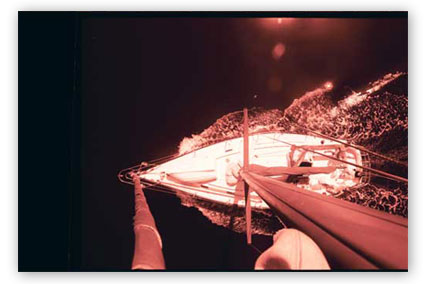
Bowline on a Bight and up the Stick.
Trincomali Channel, Gulf Islands, Straight of Georgia, British Columbia
c. 1985. Get the postcard here.
-30-
A Big Dog on BigSnit Blog
Ceasar Shoulder Checking in the Fargo
c. 1983 Falcon Lake Manitoba

-30-
Antiques on Hastings

Antiques. Richards & Hastings, Vancouver, 16 August 2005
Under the Granville St. Bridge

Sitting under the Granville Street bridge, on Granville Island, sipping a coffee today I was mesmerized by the bits of handicraft around me. The rivets & nuts and bolts never cease to amaze me, the bridge assembled like a big mechano set. Each piece designed and cut for this one bridge only, solid and real and nothing like what I do with bits and bytes. Then there’s the little cedar bench tucked away in a corner, with its clean lines and wood peg contruction. Its just as unique, and just as sturdy as the day it was built. On an island crawling with arts and crafts, these two get my nod today.

I shot both these frames without moving – one up, one down to the right (the telephoto lense helps).
-30-
Podcast 08-02

Today’s blog is a wee podcast to whet your appetite. Shorter than your average pop song, but so much more dynamic range. Tweaked for ultimate ipod listening, it runs 2:50. Simply an introduction.
It’s here
-30-
